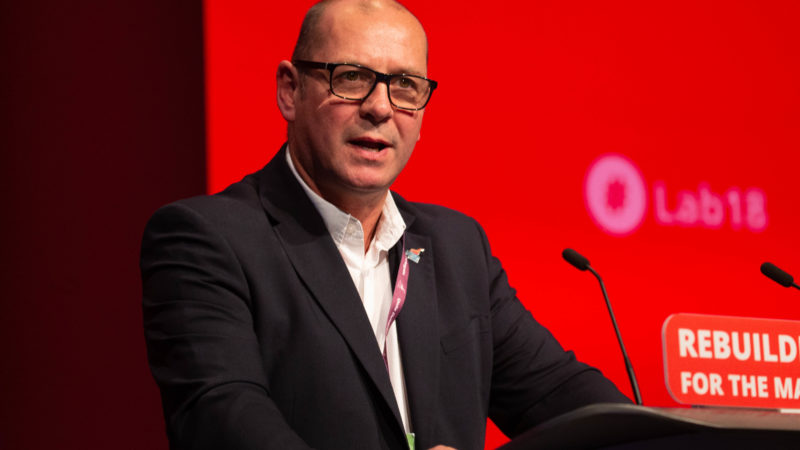
Over the past seven weeks, trade unionists have put in an incredible shift. Our members have worked in their millions throughout the pandemic, risking their lives providing frontline care and support to the country, driving buses, collecting refuse and delivering our post while millions more have been furloughed with pay protection from government, secured by their unions. Trade unions have also been at the virtual table in daily discussions with ministers and employers, thrashing out the urgent measures needed to keep our people safe, money in our pockets and good jobs to return to.
But we are not putting our feet up. The concern now is that we are in the embrace of the worst recession in 300 years, which brings terrifying prospects for working people. The jobs cliff-edge may have moved to July, with employers being asked to pay their fair share towards wage protection from August, but there is an urgency to our calls for a comprehensive jobs creation programme to take shape now. No time should be wasted in getting back round the table – unions, ministers and employers – to agree a post-Covid-19 plan and strategy to build back, and better.
There’s no doubt that we’re a changing country. Key workers are getting the recognition – if not yet the pay and job security – they rightly deserve. We are becoming increasingly aware of coronavirus as a class issue, disproportionately hurting the most vulnerable, poorest and minority communities.
But we have also become a country that now sees what can be done when government opens up to unions and steps up to its role as an interventionist, strategic partner in the economy. Parts of government may well be struggling with its new role, retaining a stubborn opposition to intervention. But going back to ideological ‘business as usual’ would be a huge mistake.
My advice to the government is to use this moment to reshape our economy for the better: show that you value and will provide dignity to long-neglected key workers; diversify from an over-reliance on the finance and service sectors; and reset our country to meet the challenges of the future. Address the climate emergency and in doing so create millions of skilled ‘green jobs’ to meet our future needs and localise supply chains.
UK manufacturing is ready-made to support the country through these social and economic challenges. Remember that for every one manufacturing job, four more are supported in the wider economy – putting money into our communities, high streets and the Exchequer.
A consensus is already developing across the political spectrum on the programme needed to inject the investment and equip the economy to weather these challenging times, centring on a manufacturing revival with support for measures including:
- Establishing a National Council for Recovery to develop a strategy for economic renewal, job creation and a just transition to a fairer, greener future for our nations and planet.
- Encouraging our manufacturers to diversify production to meet our needs for heat pumps, carbon capture, hydrogen and the green energy generation.
- The development of domestic and commercial energy storage, battery manufacturing and infrastructure to support the transition to electric vehicles.
- Retrofitting our homes to provide energy efficiency, while supporting a shift towards working from home with the manufacture and installation of high-speed fibre broadband into every home, providing the digital connectivity the country now needs.
Coronavirus has exposed what we’ve long said: there are gaping wounds, massive structural weaknesses in our economy. A clear road map to a journey through this crisis is urgently needed. With many sectors requiring long-term support and flexibilities in the job retention scheme to enable short-time working and job-sharing measures, government must act now to protect jobs, skills and wages until the economy recovers. We don’t have the luxury of time.
Loosening the lockdown and encouraging a return to work is about more than ensuring safe workplaces. A phased return must be planned, supply chains re-opened and, most importantly, we have to ensure demand for services and products in an economy where the market for big ticket items like cars has collapsed, and where sectors from aerospace to hospitality, catering to retail, are being swept along in the destructive waves engulfing aviation and a collapse in confidence and tourism.
More than ever, UK manufacturing matters. With strategic purpose, our skills, supply chains and communities can be harnessed not just to fend off the threat of mass unemployment but to deliver for our changing society. With manufacturing restored to its rightful place as the bedrock of our economy, we can do this. Just as Germany is already doing, we must build the industrial and political alliance necessary to invest and produce our way out of an impending depression.
Our country is changing, and the fear and uncertainty being felt in communities is genuine. But there is a way forward staring government in the face. The UK’s world class manufacturing sector, our unions and a highly skilled workforce are eager to play their part in building the bridge over this crisis and towards a fairer, greener and stronger economy. We have the ideas. We know what can be done. Time to get back round the table with the unions, Chancellor.




More from LabourList
Starmer or Sarwar: Scottish Labour MSPs and MPs split over Keir Starmer’s future
‘Every Lidl helps: What can the Government do to bring down food prices?’
Delivering in Government: your weekly round up of good news Labour stories